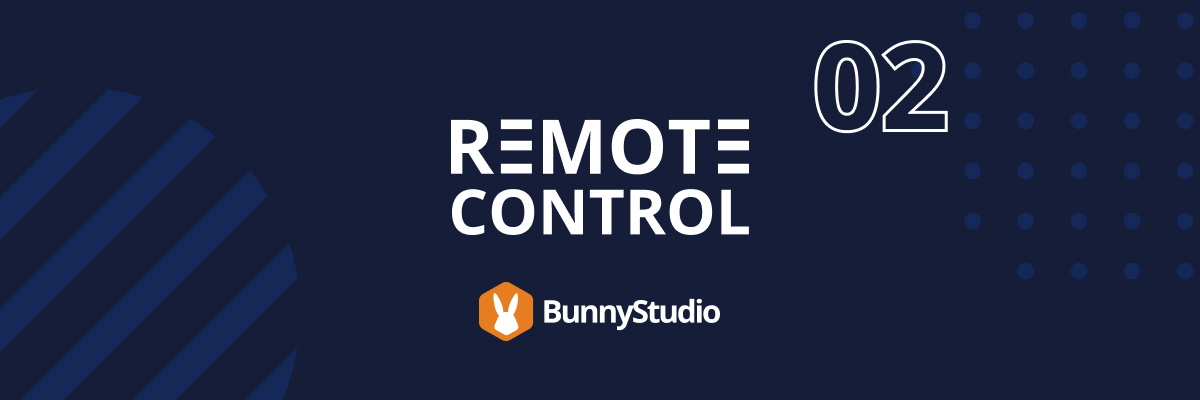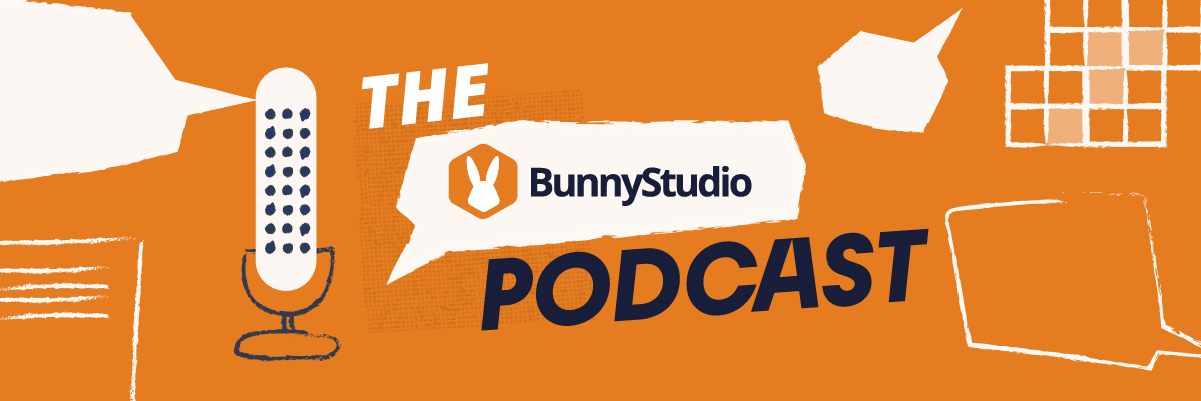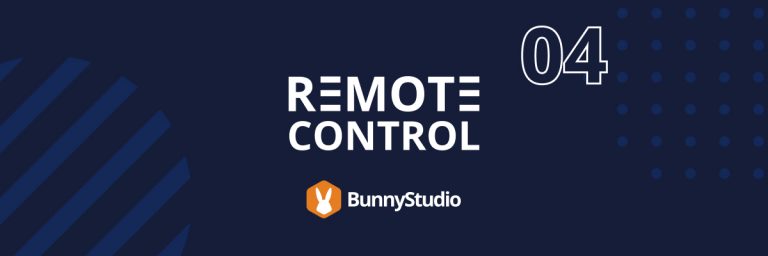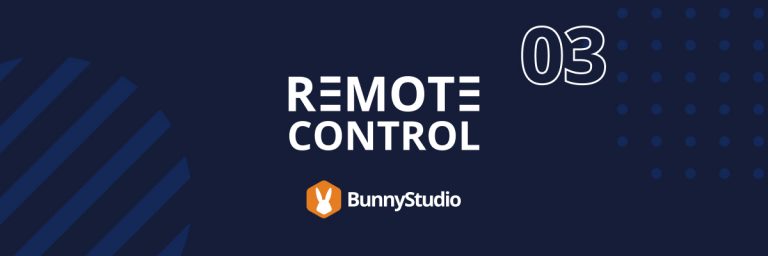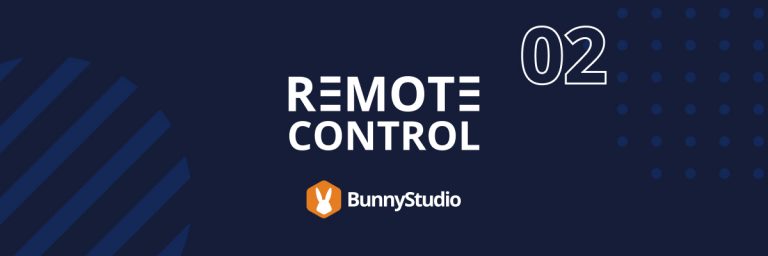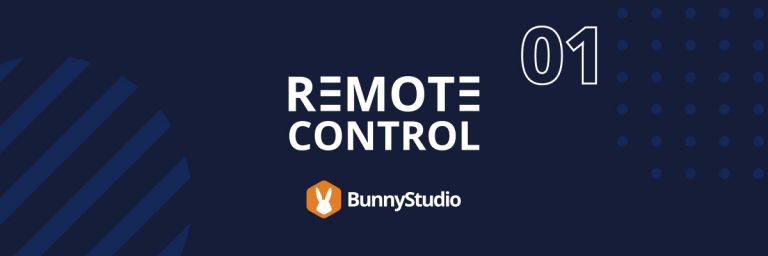— PROLOGUE —
When you’re a manager, coordinating across an office, communication is important. When that office is spread out over continents, communication is critical.
Remote work teams need more than tasks and to-do lists. They need transparency. They need to trust their coworkers and their organization. And for traditional, rigid workplaces, transparency is downright scary.
In this episode, Robin Chen tells us how remote work led to a journey of discovery. And how vulnerability led to strength.
Along the way, we’ll explore what it means to foster open communication, and how transparency brings us together – no matter the distance.
— INTRO —
Hey, I’m Maika Hoekman, Head of People Operations at Bunny Studio, and I’m a remote worker.
Welcome to Remote Control: A series that helps you unlock the possibilities of remote work. Together, we’ll find success stories, expert tips, and insights to help you navigate the new office.
Remote Control is brought to you by Bunny Studio. Trusted by more than 50,000 companies every year, Bunny Studio helps businesses scale their creative needs with a vetted crowd of freelancers.
— ACT ONE —
Maika:
Communication is how we understand the people we share our lives with, including in our workplaces.
Communicating in the workplace is more than general meetings and departmental memos – it’s conversations, informal chats, catchups, and connecting with the people on your team.
So when that team is two countries and three time zones away, how we communicate should change. It’s estimated up to 93% of communication is non-verbal. 93%! Considering this, it’s hard to believe that a daily email has a chance of making up for office culture.
If you want to reap the benefits of remote work, there’s a responsibility to open up communication. To create transparency. So your team can check in on each other – regardless of their location.
Bunny Studio, my company, has worked remotely for 8 years. We’ve navigated this exciting new environment and are still learning so much about the future of our work. It’s a future that considers how we talk to each other. How we relate. How we show compassion. It’s a new kind of communication and it’s sure to change how you approach your next meeting.
Robin:
Especially me, when I first stepped into a management role I had this view that I had to appear superhuman to the rest of my team. Like yeah, I’m working longer than all of you, I’m doing more work than all of you. Like, I deserve to be in this position. I did a lot of chest-puffing because I stepped into a kind of a management role when I was like 24-25. And I was a lot younger than a lot of people that I was working with. And so I really did feel like I had something to prove, and it was like not that healthy for the people that I was working around.
Maika:
Robin Chen’s a Product Manager for SMA, a global solar energy company. In that time he’s not only been a remote worker but he’s also had to coordinate remote teams which don’t come with a step-by-step guide.
Robin:
I had the benefit of two years of remote work experience before going into this whole lockdown period.
Remote culture was definitely something that we had to learn.
It was really hard for some of us, for myself, I know I definitely struggled, I was very young and still learning the ropes of how to work in corporate. Like, let alone, manage this whole thing and not being able to see anyone and not have any kind of guidance. There were definitely days which were like, I pretty much got no work done and it was quite sad at home. But it was, it was something I had to learn how to do.
Maika:
Managers like Robin have had to figure out the pathways to success in the remote world. They’re having to rely on trial-and-error, and they’re all finding out that Communication is key.
Caroline:
It’s just a new way of doing things, to be honest, I think it’s having these conversations, having this information shared in this really public and accessible way. I think that’s super important, and I think staff does feel heard, they have accountability, they have responsibility. I think it does definitely help.
I guess I’ve been working in public for quite a while now. I’ve worked across the world, I’ve lived in a number of different countries and currently, I’m based in Manila in the Philippines.
Maika:
Caroline Lukaszyk works in a global health organization. She’s no stranger to coordinating a multinational team.
Caroline:
We are able to work remotely, however, we do have to have our own coordination mechanisms in place.
It’s really easy to feel quite disconnected when you’re working remotely.
It was quite tough, so using these sort of more informal methods of communication really helped us to stay connected, helped us realize how much communication happens in those informal settings in the workplace and, you know, the priority for us is that we are connecting regularly. We are connecting with whatever methods we can.
Maika:
People like Robin and Caroline have had a head start adjusting to remote work. Entire companies have trailblazed in this space, too. Take Buffer, for example. They’ve adopted remote work completely.
Heather:
We spend a lot of time on Zoom. I think last year alone, we spent around 1.2 million minutes on Zoom as a team, which is a lot of time. So lots of face-to-face time, from afar.
There’s just so much asynchronous communication that goes on that I think we often forget who’s in what time zone and so there’s kind of this blending of locations.
I’m Heather Mae, I work at Buffer, which is a fully remote company, and we build products to help our customers build their brands on social media.
Maika:
Buffer is a tech company. They make social media tools. Their team is spread out over 19 different countries… and they’ve taken a radical position on transparency. It’s one they hope catches on.
Heather:
One of the unique things about Buffer is that we are all so close, even though we’re so far apart.
When I was off for family leave, I was so sad and I missed our team so much and they were such close, like friends and confidants, we spend so much time together – virtually – and there’s this opportunity to really be authentic and we’re encouraged to be our true selves.
And I think that transparency really translates to a sense of honesty and a willingness to admit fault sometimes. Where we just decided that there was nothing so sacred that we couldn’t share it.
Maika:
Sharing – It’s what turns conversation into connection.
And sharing work is only the start. Transparency means letting your team see the highs – and the lows.
Robin:
Whatever it is, there needs to be some kind of way to connect with your colleagues. You need to provide for your team to connect with each other outside of just a work basis.
And those little moments are really important for a team.
It’s so beneficial to the longterm mental health of your employees and the entire company as a whole. That transparency of like, it’s okay to be human and having those moments where you do fail, knowing that it’s okay to share that failure with the rest of your team. You don’t need to kind of be superhuman all the time.
Caroline:
So again, this is just something we’re still working out. It’s definitely something that we’re still adjusting and adapting to.
I think, perhaps we need to get a little bit more innovative with how we’re communicating. I think so far we’re using all of these, you know, virtual mechanisms like Zoom and MS Teams and yeah, sure, WhatsApp and Viber, some more informal channels as well. But at the end of the day, there is this disconnect a little bit.
And maybe it’s about trying to find out how we can take this really formalized approach to transparency and to sharing and make it a bit more intuitive and a bit more personal as well.
Maika:
Transparency is a crucial exchange of information. It’s two-way, free communication.
After all, if you expect transparency from employees, you need to provide it. How you can do that? Find out next after the break.
Break:
Hey! If you’re liking what you hear and you have a minute, please subscribe, rate, and review on whatever app you’re using to listen. We are on Apple Podcast, Spotify, Google Podcasts, Amazon, and more! This helps us get the word out to others in this industry. Thanks for listening.
— ACT TWO —
Heather:
So many of us can relate to having jobs where we knew that there were conversations going on behind closed doors and then decisions were made and everyone was kind of left wondering, okay, well, what happened?
And I think all of those toxic experiences that I had left me really craving just an honest place.
Maika:
Transparency from the ground up – from employees – is common. Managers love this. It makes it easy to track output and progress when employees are transparent.
Transparency from the top down, however… that’s less common.
And it’s so much more important for remote work.
Max:
What we really want to do is make sure all of the information is aligned, that the customer is getting consistent information from all of the different touchpoints. And it’s important as owners of the company to create that cohesive experience for our customers, no matter where they meet us, you know, that’s the importance of transparency. It’s what we’re doing, how we’re delivering value, why it’s valuable.
The clearer we are in our internal communication, the easier it is to scale and grow the company and service of that customer.
Maika:
That’s Max Makeev, a co-founder of Owl Labs. They’re leaders in the world of remote work and report on the growth of the industry.
We’ll hear more from Max in a later episode, but he brings up the responsibility organizations have. To foster open communication – and not micromanage.
Robin:
There’s plenty of tools for, project management or transparency over a team. I think managers need training on them, how to use them effectively in a way that isn’t just like assigning 6 million tasks to this one poor employee.
You need to make it very clear I think, as a team leader, I’m not going to be looking at this every single day to make sure that you know, you’re doing your tasks and stuff like that. You never want to be micromanaged.
Most people don’t want to be micromanaged, right? Like it’s a nightmare at work.
Caroline:
When there is a decision made or some new information available, it’s shared, promptly, like in a timely way, so that we’re all updated together. We’re all on the same page. You have to go out of your way to do this. It’s not so easy to just very quickly share now, but this is really important.
Really consult with people before making decisions and doing activities, making sure that everyone does feel like they’ve contributed to something.
It is super crucial that we prioritize this and we make this a set daily commitment.
I’d love to know what other organizations and companies are doing in this space because I think we could definitely learn a lot.
Maika:
Buffer has been doing this so long that they understand transparency is an outcome. It’s almost guaranteed – if you’ve laid out the structures if you’ve built the culture that allows your team to succeed.
So, what does it mean to build these pathways for workers?
Heather:
We’ve had to set really clear expectations of what channels are used for what types of communication. So, Slack is for kind of immediate questions and chatter. Threads would be where you might kick off a conversation with multiple team members, cross-team communication, and looping people in. Knowing what that flow looks like and how to accomplish that makes it easier.
It’s something I’m super passionate about because I’ve learned through the years having three children, Buffer was the first time where there was a really intentional and clearly laid out Family Leave policy. In that process, you were paired with someone to kind of help you in that transition out, in terms of wrapping projects, talking through any anxieties or kind of fears or doubts. For me, there was this struggle of, well, I’m not going to be progressing in my career because I’m out welcoming this new little person to the world.
The greatest wisdom came from my lead, Darcy. She’s incredible. She said, “you are exactly where you are supposed to be, and that is with your family”. And having that permission to let go and be present is something that I hadn’t experienced with any of my other children.
Maika:
Every team member has a part to play in maintaining a transparent culture. But where and how does it start? Heather-Mae shares her thoughts on the work of Joel Gascoigne, one of Buffer’s co-founders.
Heather:
I think that starts at the top. Joel has done a fantastic job, kind of setting an example of that. He often will create threads for us, sharing what he’s been kind of ruminating on, and admitting when he has struggled, knowing when he is teetering on burnout and communicating that to the team and really encouraging other people to be intentional about thinking, about where they are, and what they need. And that has, I think really, really resonated for everyone. And so having your leader, like the person at the top of the company, demonstrating that, I think gives permission to the other managers and team members to also do that.
Maika:
Other organizations are adopting this approach. Top-level management is making space and time to share – and workers are noticing it.
Caroline:
What we’ve been doing at the regional level is having these things that are called Town Hall meetings. Basically an opportunity for everyone all staff to join in virtually. We have updates shared about the current status of staff in the workplace, what’s happening at the workplace. What’s happening with countries and then we’d have the question-answer session at the end.
So, staff can send in questions they’d like answered by Senior Management and these get shared during this Town Hall meeting and our Regional Director will provide responses, a Director of Finance will provide responses.
So it’s a really helpful way of the regional office coming together and sharing concerns, sharing ideas, and sharing thoughts. So that’s been really helpful and really nice. We’ve had a very personal element to these most recent Town Halls and we’re talking about, challenges around living in Manila right now, working remotely from overseas about trying to plan return to the office. It’s been, yeah, much more personal, and much more practical.
Having this sort of unifying meeting is very, very helpful, people can be very honest, they can ask challenging questions and it’s all heard and responded to. So, that’s very helpful.
Maika:
These top-down responses show how empathetic management – transparent management – accommodates workers. It’s an element that runs through all successful remote work approaches. Flexibility.
Heather:
Whatever schedule I needed there’s just the expectation that you get your work done, whether that’s at three in the morning because your baby is up, or you are staying up late, or it’s midday or you’re powering through work at nap times. I mean, there really was so much flexibility.
— ACT THREE —
Maika:
Communication is key, but when does overcommunication become a problem? And what do we do about it?
Heather:
One of the biggest challenges in being this transparent is there’s an overwhelming amount of information shared.
Everything is documented. Everything is visible throughout the entire company.
And I think that there are times where it can be really overwhelming to stay on top of everything and so many notifications.
That’s constantly in evolution for us to find ways to not overwhelm our team with information and kind of hone in on the specific spaces that we want to use.
Robin:
In an office, I think we just go and tap someone on the shoulder for a conversation. Whether or not it’s about work, you know, if you need something or you just want to get to know someone to learn what everyone does, for the future, and also for them to know who I am in case something that they learned is useful to me.
It’s so taken for granted, it feels so troublesome for us to go and book 30 minutes into someone’s calendar, just to say hello. Like you do really feel like you’re bothering them, right. Cause you know, everyone’s busy, everyone’s got stuff to do, and to just be like, “hey, can I have 30 minutes of your time to say hello and introduce myself?”. Not being afraid to do that is really important.
Heather:
Oh gosh, it was really difficult for me when I joined Buffer, I came from kind of that immediate gratification environment where answers were immediate.
It was a very intentional mind shift. You had to change the way that you thought about the urgency of things. So yes, we’re collaborating on this project. Do I need an answer right now? Probably not. Could I wait a day?. Yeah, probably, but it also goes along with kind of that mentality of nothing is so important that you have to stop your life for that answer. And so I think once people can realize that your work is not everything, that you are an individual with a whole life outside of work, then it helps to kind of ease that stress of needing instant information.
Maika:
Let’s say our old expectations get scrapped, and full transparency becomes commonplace. What happens then?
Culture shifts can cause dramatic effects on an industry. And our remote leaders are right at the forefront of this radical change.
Heather:
And really, I think probably the boldest step was republishing our salaries. I think that was kind of the start of really making it forward-facing and from there it was okay, well, what else can we share?.
We created a diversity dashboard. I think we even had a sales dashboard, so you could see how much money we were making our revenue.
How much money we’ve given to charity, how many books we’ve given to team members, how much we’ve supported certain initiatives, such as the Black Lives Matter movement.
We make public commitments and hold ourselves accountable and are even working to be more transparent.
Maika:
If you’ve adopted transparency there’s an incredible opportunity for innovation. And remote workers are welcoming that change.
Robin:
I’m definitely one of those people who think that we should keep doing remote work past this whole period. I’m hoping that everyone learns that that is a thing.
Remote work is like, it’s so beneficial going forward and I think used properly it’s such a great tool.
If you can be one of those people who, you know, makes someone’s day more energetic, more positive, it is such a big benefit to kind of just the long-term productivity of your team.
Maybe in the short term if you crack the whip really hard, you can get, you know, that single project out on time, but that person is gonna remember for you know, the rest of their career at this company, the time that you made them, you know, like work twelve extra hours on end when say, you know, they were sick or a close family member just passed away.
Like, just having that transparency, it’s so beneficial to the long-term mental health of your employees and the entire company as a whole.
Maika:
That approach is the essence of transparency. Knowing that communication helps us understand each other. We share, and that means we can’t help but connect. And ultimately, make a better culture.
It’s a culture of the future. A culture that promises awareness and flexibility. Mutual openness that makes ethical workers, ethical organizations.
Some of the hardest work we do is unlearning old habits. But it’s work we have to do. So that we can change the culture we know, into the culture we want.
Caroline:
I think if anything has become more of a parallel culture, it doesn’t mirror what we had in the office when we were all working face to face and in-person continuing remote work, it has to be something a little bit creative and a little bit different to what we’re doing now. I’m not sure what that could be, but I think we’re definitely, on a good track with what we’re doing.
— OUTRO —
Thanks for listening to Remote Control: A series helping you navigate the exciting possibilities of remote work.
Remote Control is brought to you by Bunny Studio. Trusted by more than 50,000 companies every year, Bunny Studio helps businesses scale their creative needs with a vetted crowd of freelancers.
Find great video creators, voice over artists, designers, writers, and more. Find out more at bunnystudio.com
If you liked this episode, please share this with someone that would find this of interest. And while you’re at it don’t forget to subscribe, rate, and review on whatever app you use to listen.
Credits
This episode was produced in collaboration with Bunny Studio and Pod Paste in Sydney, Australia.
- Executive Produced by Daren Lake
- Written and Produced by Aidan Molins
- Audio Production, Sound Design, and Engineering by Aemyn Connolly
- Podcast management by Michelle Le
- Supervising Editor – Mike Williams
- Assistant Storywriter – Charles Montano
You can check out all of our amazing guests who helped make this episode great:
- Heather-Mae Pusztai – Customer Engagement Advocate at Buffer
- Max Makeev – Co-founder of Owl Labs
- Caroline Lukaszyk – Technical Officer, Violence, Injury Prevention & Reduction of Harmful Use of Alcohol at World Health Organization.
- Robin Chen – Product Manager for SMA

